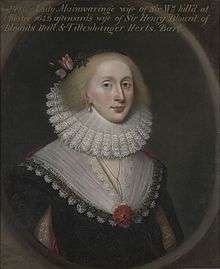Sir Thomas Blount, 1st Baronet
Sir Thomas Pope Blount, 1st Baronet (12 September 1649 – 27 January 1697) was an English baronet.[1][2]

Thomas Pope Blount was born on 12 September 1649 in Upper Holloway,[1] Islington, London, son of Sir Henry Blount and Hester Wane. Thomas was the brother of Charles Blount.[1] Thomas married on 22 July 1669 Jane Caesar, the daughter of Sir Henry Caesar.
He was admitted to Lincoln's Inn on 1 December 1668. In December 1678 he succeeded to the estate of Tittenhanger in Hertfordshire from his mother. He was the Member of Parliament for St Albans[1] between 1679 and 1681 and for Hertfordshire between 1689 and 1697. He was a Commissioner of Public Accounts between 1694 and 1697.
His Essays on Several Subjects have been described as openly deistic. He also published a remarkable biographical dictionary and other works.[3]
He was created a baronet, of Tittenhanger on 27 January 1679. On his death in Tittenhanger the title passed to his son, Sir Thomas Pope Blount, 2nd Baronet.
Works
- Censura celebrorum authorum sive tractatus in quo varia virorum doctorum de clarissimis cujusque seculi scriptoribus judicia traduntur (1690)
- Essays on Several Occasions (1692)[1]
- A Natural History, containing many not common observations extracted out of the best modern writers (1693)
- De re poetica, or remarks upon Poetry, with Characters and Censures of the most considerable Poets (1694)
References
- Chisholm, Hugh, ed. (1911). . Encyclopædia Britannica (11th ed.). Cambridge University Press.
- Leigh Rayment's list of baronets – Baronetcies beginning with "B" (part 3)
- Thomas Pope Blount in A Biographical Dictionary of Modern Rationalists
| Baronetage of England | ||
|---|---|---|
| New title | Blount baronets 1679–1697 |
Succeeded by Thomas Pope Blount |